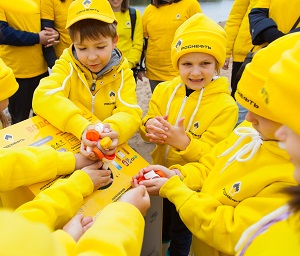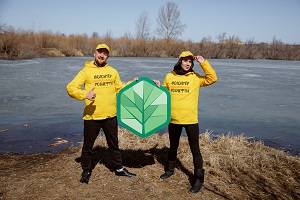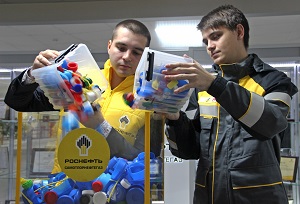Rosneft Implements Circular Economy Principles

November 15 is International Recycling Day, the main aim of which is ‑to draw the attention of public organisations and citizens, industry and government institutions to sustainable resource use and pollution prevention.
Reaffirming its commitment to achieving sustainable development goals, Rosneft pays increased attention to environmental safety and works continuously to minimise its environmental impact. One of the priority goals of the Rosneft-2030 strategy is to improve the efficiency of waste management processes. The Company has approved approaches to implementing the circular economy principles, including developing opportunities to increase recycling of produced oils and packaging; reducing the use of plastic expendable materials, including in cafés and petrol station shops; establishing indicators and metrics to monitor the implementation of the circular economy principles; and developing training courses for Company employees.
Rosneft's enterprises have equipped sites for waste sorting (plastic, paper, cardboard, scrap metal, etc.) and organised recycling of electronic waste - batteries and computer, electronic and optical equipment. Waste is delivered to special treatment, neutralisation and disposal facilities, also with the use of the best modern technology. Producing assets use drilling waste products for road filling, production sites and other activities. The Company achieved a patent for the invention of a green technology for recycling cuttings into a highly eco-friendly construction material as part of the Vostok Oil project development.
 An important aspect of the circular economy‑ is increasing the standard of environmental culture and developing an eco-volunteer movement. Since 2020, employees and their families have collected more than 825 tonnes of waste paper, plastic and batteries within environmental campaigns and initiatives and delivered it to recycling organisations.
An important aspect of the circular economy‑ is increasing the standard of environmental culture and developing an eco-volunteer movement. Since 2020, employees and their families have collected more than 825 tonnes of waste paper, plastic and batteries within environmental campaigns and initiatives and delivered it to recycling organisations.
Volunteer activities aimed at the efficient use of secondary resources are continuously carried out. Special containers are set up at facilities where employees collect waste paper, plastic and batteries and deliver them for recycling. In addition, as part of environmental campaigns, oil workers do landscaping work and clean up household waste in parks and squares, popular recreational areas and rest areas. The waste is sorted and sent to recycling companies.
Employees of the Kuibyshev Refinery, Novokuibyshevsk Petrochemical Company, Novokuibyshevsk Refinery, Syzran Refinery, Novokuibyshevsk Oil and Additives Plant, as well as Rospan, Samotlorneftegaz take part in the Russian environmental charity volunteer project for plastic collection, sending the proceeds from recycling to the Volunteers to Help Orphans charity fund. The fund uses the received money to purchase rehabilitation equipment for children with special needs in foster care.
Employees of Rosneft's enterprises in the Krasnoyarsk Territory - Slavneft-Krasnoyarskneftegaz and RN-KrasnoyarskNIPIneft - implemented a comprehensive environmental project for plastic recycling. Over 500 oil workers participated in the Clean World as a Gift for Children campaign. Employees collected about 100 kg of plastic waste in two months - lids, bottles, packets and packaging. The collected plastic was sent to a recycling plant where it was cleaned and treated to make stuffing for soft toys. The fibres were used to make toys in the form of animals native to the Krasnoyarsk Territory. Polar bears and sables were presented to Krasnoyarsk and Evenki schoolchildren on Knowledge Day.
 The Saratov Refinery participates in the regional environmental «Stop Algae!» campaign. The project aims to address several objectives as follows: restoring the biodiversity of the Volgograd Reservoir, preventing active blooms in the river, recycling plastic, and encouraging the younger generation to become involved in the environmental movement. Saratov oil refiners, together with students from Rosneft Classes, collected more than 50 kg of plastic lids. All the funds raised from the recycled plastic were used to buy herbivorous fish fry, which were released into the Volga River. The average adult carp, bighead carp or white amur eats more than a kilogram of algae per day, helping to prevent algae overgrowth in the river.
The Saratov Refinery participates in the regional environmental «Stop Algae!» campaign. The project aims to address several objectives as follows: restoring the biodiversity of the Volgograd Reservoir, preventing active blooms in the river, recycling plastic, and encouraging the younger generation to become involved in the environmental movement. Saratov oil refiners, together with students from Rosneft Classes, collected more than 50 kg of plastic lids. All the funds raised from the recycled plastic were used to buy herbivorous fish fry, which were released into the Volga River. The average adult carp, bighead carp or white amur eats more than a kilogram of algae per day, helping to prevent algae overgrowth in the river.
As part of the Green Office project, office paper is regularly collected at enterprises. The eco-boxes have been installed in the buildings of the enterprises and each of them is provided with a leaflet on how to dispose of the documents. The paper and cardboard are sent for recycling after shredding. A wide variety of products are produced from cleaned, premium grade paper, which includes office paper.
In order to create optimal conditions for the development of the national production and consumption waste management industry, participate in the work of industry associations and unions. For example, in September 2022, the Company's subsidiary, Rosneft-Lubricants LLC, became a member of the Waste Recycling Association. Participation in the Association contributes to the achievement of key objectives to improve the environmental performance of the Company's operations and the development of its environmental culture.
Rosneft
Information Division
November 15, 2022